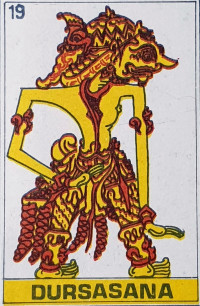Wayang Dursasana
The Embodiment of Arrogance in the Kurukshetra War.
Within the intricate stories of Javanese Wayang Kulit (shadow puppet theater), Dursasana emerges as a prominent antagonist, renowned for his pride, cunning ambition, and an unwavering, self-serving loyalty towards his Kurawa cousins. A complex figure often embodying the destructive nature of unbridled ego, Dursasana plays a pivotal role in igniting the climactic Kurukshetra War.

Lineage and Appearance
Dursasana is one of the one hundred sons of King Dritarastra and Queen Gandari, rulers of the kingdom of Hastinapura. His name means "difficult to conquer", which hints at both his arrogance and the trials his actions bring about. In Wayang depictions, Dursasana is often portrayed with features reflecting his character: sharp teeth, a protruding abdomen, and a brash demeanor.
Jealousy and The Draupadi Incident
One of Dursasana's defining traits is his bitter rivalry with the Pandawa brothers, the five virtuous protagonists of the Mahabharata. This jealous hatred intensifies after the Pandawa prince, Yudhistira, becomes the emperor of Indraprastha, sparking envy in Dursasana’s ambitious heart. However, the most infamous act associated with Dursasana is his role in the humiliation of Draupadi, wife of the Pandawa brothers. After Yudhistira loses a rigged gambling match against the Kurawas, Dursasana orchestrates the public disrobing of Draupadi. This act of cruelty fuels the Pandawas' desire for revenge and sets the stage for the devastating Kurukshetra War.
His Fall in War
Throughout the Kurukshetra War, Dursasana fights vehemently alongside his Kurawa brothers, often utilizing less-than-honorable tactics. He meets his end in a brutal duel with Bhima, the second of the Pandawa brothers. As promised earlier by Bhima, Dursasana is slain, and Bhima drinks his blood to avenge Draupadi's dishonor.
Symbolism and Interpretation
Wayang Dursasana is not a character designed to be liked. Yet, he serves as a cautionary figure. His actions show how egotism, unchecked ambition, and disregard for virtue can lead to destructive ends, not only for individuals but for entire kingdoms. The story of Dursasana raises questions about the dangers of blind loyalty and how personal grievances can escalate into catastrophic conflict.
Last updated